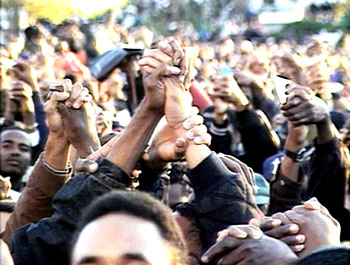- Black men taking responsibility (Min. Louis Farrakhan, 11-14-2004)
- Finding ‘Black Men First’ on the frontlines (FCN, 02-17-2004)

NEW YORK (FinalCall.com) – Reaction to the March 20 New York Times front-page story, entitled “Plight Deepens for Black Men, Studies Warn,” has been varied, to say the least. In his article, Erick Eckholm reported that studies from Columbia University, Princeton and Harvard show that the “huge pool of poorly educated Black men are becoming ever more disconnected from the mainstream society.”
“When were we ever part of the mainstream?” asked members of the Brooklyn-based Black Economic Survival, a grassroots organization that finds construction jobs for Blacks and Latinos. Everyone in the room scoffed at any suggestion that Black people would ever be considered part of the American social fabric. Many of the organization’s members have been in jail or involved in substance abuse. Nevertheless, facing all the negatives cited in the Times article, many of them have purchased homes, sent their children to good colleges and have a substantial amount of money in their annuity accounts.
“We had to fight 20 years ago to get our members into union jobs and we have to still fight. No one wants to see Blacks and Latinos make a decent living,” noted one of the group’s founders, Bob Patterson, who said it was hard to conceive why anyone would write such a story. “What is their agenda?” he asked.
“This story is hot here in the Chicago educational community,” offered Joseph 12X Strickland, founder and CEO of the Metropolitan Area Group for Igniting Civilization (M.A.G.I.C.). He also respectfully questions the motivation behind the story, and why was it a front-page story, since most of the information was “old hat.”
Mr. Eckholm admitted in his story that the problems facing Black men had been known for “decades” yet, “the new data paint a more extensive and sobering picture of the challenges they face.”
Professor Harry Holzer, an economist at Georgetown University and co-author of the book “Reconnecting Disadvantaged Young Men,” explained why he believed the story was written. “I believe that Eric wanted to do something on poverty,” Prof. Holzer offered, quoting the Times story in saying the “1990s was a bad decade for young Black men, even though it had the best labor market in 30 years.”
In the opinion of Orlando Patterson, professor of Sociology at Harvard University, in his Times op-ed piece on Mar. 26, the studies cited in the Mar. 20 story highlighted “the failure of social scientists to adequately explain the problem, and their inability to come up with any effective strategy to deal with it.”
Dr. Gail Christopher, director of the Health Policy Institute at the Washington-based Joint Center for Political and Economic Studies, said the story “perpetuates the need to make the Black man the problem.”
“We felt that the only way to get the subject of the plight of Black males to the front burner was through a story such as this,” Mr. Holzer explained in an email to The Final Call.
He also shared that his greatest fear was that after a week the story would disappear from view. “I can look at the problem only through the lens of a researcher. I am sure that there is another opinion in the community, which I am not privy to,” he stressed, pointing out that the goal for he and others studying the issues facing Black males was to affect public policy.
According to Reverend John Vaughn of the Harlem-based 21st Century Foundation, having the story on the front page of the New York Times gets the issues “more in the public consciousness.”
Joseph 12X says that it is important to understand the mindset of researchers. “All researchers work with a certain bias, an agenda, that may not always surface,” he opined. “But, with all due respect, you don’t go to White men to solve the problems of Black men.”
Dr. Christopher agrees. “We don’t want the New York Times article to stand as the testimony that the Black man is the problem,” she argued.
She informed that the Dellums’ Commission, a group of scholars and public officials, headed by former California congressman Ron Dellums, which was appointed by the Joint Center in 2005, will release a report in July that offers a blueprint for policies that show the Black male is really the solution and not the problem.
“We will go forth upon the report’s release to confront elected officials of color to join us in fashioning programs for our young men,” Dr. Christopher stated. “And we want to showcase the stories of the many Black men that have succeeded.”












